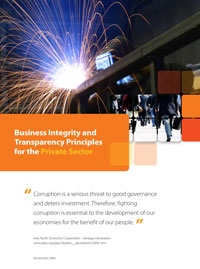
The APEC Code of Conduct for Business is a practical example of an Anti-Corruption Code of Conduct.
For more information please
download the document Eng
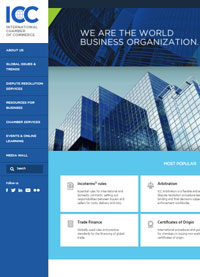
The ICC Rules on Combating Corruption constitute the cornerstone of ICC’s anti-corruption work, serving both as a tool for self-regulation by business and as a roadmap for governments in their efforts to fight extortion and bribery.
For more information please
visit the site
-Code-of-Conduct.jpg)
NATO Code of Conduct is intended to be read in the context of the NATO Civilian Personnel Regulations, other personnel policies, or applicable national military regulations.
For more information please
download the document Eng
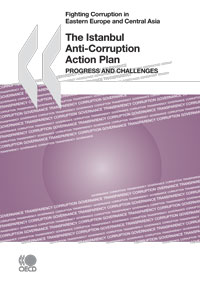
The Istanbul Anti-corruption Action Plan is a sub-regional peer review programme launched in 2003 in the framework of the Anti-Corruption Network. The programme supports anti-corruption reforms through country reviews and continuous monitoring of implementation of recommendations, which promote the UN Convention against Corruption and other international standards and best practice. This programme:
- reviews the legal and institutional frameworks for fighting corruption and makes recommendations
- monitors progress in implementing the recommendations
The results are discussed at regional meetings and published as country and progress reports.
For more information please
download the document Eng
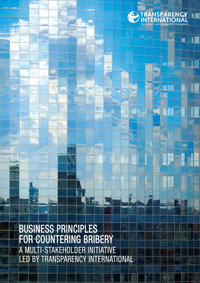
The Business Principles for Countering Bribery were originally developed through an extensive multi-stakeholder process involving companies, non-governmental organisations and trade unions, as a tool to assist enterprises to develop effective approaches to countering bribery in all aspects of their activities. The Business Principles aim to provide a framework that can assist enterprises in developing, benchmarking or strengthening their anti-bribery programmes. The Business Principles reflect a high, yet achievable standard of anti-bribery practice. They apply to the bribery of public officials as well as private-to-private transactions.
For more information please
visit the site
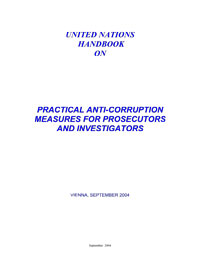
The United Nations Handbook on Practical Anti-Corruption Measures for Prosecutors and Investigators is part of a larger package of materials intended to provide information and resource materials for countries developing and implementing anti-corruption strategies at all levels, as well as for other elements of civil society with an interest in combating corruption.
For more information please
download the document Eng
.jpg)
The objectives of GAIN are to integrate anti-corruption solutions in service delivery to contribute to Millennium Development Goals acceleration and post-2015 development goals; to strengthen state/institutional capacity to implement UNCAC and prevent corruption; to mitigate corruption risks in climate finance and natural resource management; to enhance civic engagement, youth and women’s empowerment for increased transparency and accountability at national and local levels; and improve results-based management and institutional effectiveness on anti-corruption.
For more information please
visit the site
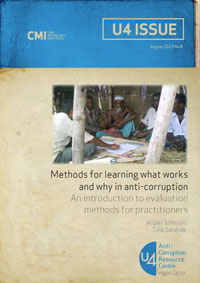
This paper offers practical guidance to practitioners who design, implement, and disseminate evaluations and research on anti-corruption. A range of quantitative and qualitative methods can be used to answer operational questions on the impact of anti-corruption interventions. Although some methods can produce stronger evidence than others for a specific evaluation, there are tradeoffs between rigour and costs and between aspiration and feasibility. Donors should let the evaluation question, programme attributes, and availability of data determine the most appropriate methods for a given study. With careful planning and adequate resources, donors can use many of the methods presented in this paper. This should give more reliable results and produce needed knowledge on what works in anti-corruption, laying the basis for more effective anti-corruption initiatives. U4 is a web-based resource centre for development practitioners who wish to effectively address corruption challenges in their work.
For more information please
visit the site
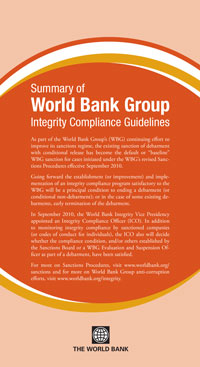
The Summary of World Bank Group Integrity Compliance Guidelines incorporates standards, principles, and components commonly recognized by many institutions and entities as good governance and anti-fraud and corruption practices. Although they are directed principally at sanctioned “parties,” others are encouraged to consider their appropriateness for adoption. They are not intended to be all-inclusive, exclusive or prescriptive; rather a party’s adoption of these Guidelines, or variants thereof, should be determined based on that party’s own circumstances.
For more information please
download the document Eng



